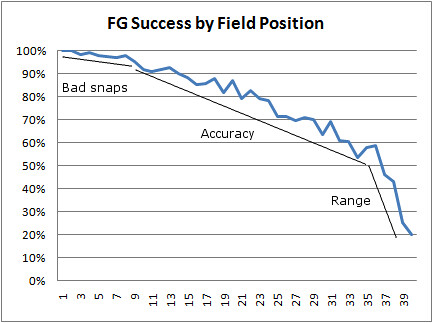Re: how does the saints decision to kick a FG on 1 down compare to.........
I would definately disagree there. Getting long snap -> hold -> kick to work is much harder than snap -> handoff -> secure ball.
Last year NFL kickers missed 3% of the time from 20-29 yards and 16% of the time from between 30-39 yards. Supposedly the chances of missing are an exponential function for each yard you go out so 29 yards must be between 6% and 7% chance of missing. Add in the fact that its pressure time for the field goal kicking team and the defense is not playing safe coverage and you've got to have a chance of missing over 10%.
And Garrett Hartley isn't even an average NFL kicker.
Drew Brees last year had a 2% chance of throwing an interception each time he dropped back to pass. There was a 1% chance of Brees fumbling, and a 1.5% chance of the running backs fumbling. You run three plays and you have an 8% chance of a turnover, but at least a 60% chance of scoring a TD. THEN you can try a field goal. (Or maybe after two plays if you're worried about a bad snap or hold.)
I think people should always give themselves the best chance to succeed. But what often happens is a kind of lock-in where the decision maker will come up with a percentage where they're willing to go all in on an all-or-nothing play, then pull the trigger right when that threshold is reached. This is probably a coping mechanism for quickly relieving pressure; i.e. giving yourself a clear goal to shoot for instead of constantly playing percentages.
I enjoyed reading this. I am curious, though, about the odds of an offensive holding penalty. To me, that is a lot higher risk than a turnover. I usually think coaches should keep putting the pedal to the metal, especially if they have a responsible, accurate QB like Brees. However, I stand by my original comment: a 29-yard field goal is a golden ticket.
As you mentioned, running three players is an 8% chance of a turnover, while kicking the field goal has roughly a 6-7% chance of missing. You'd also have to factor in a couple of other things, including a holding penalty (already mentioned.) Also, the kicker is indoors and at home, so the percentages are probably better for that kick. By the same token, the Saints are less likely to turn the ball over with safe, low-risk plays designed to prevent losing the football.
Now, compare this situation to Herm Edwards in 2004.
The Jets responded with a drive inside the Steelers 30-yard line, but Brien missed a 47-yard field goal attempt with 2 minutes left in regulation. Two plays later, New York defensive back David Barrett gave his team another chance to score the winning points by intercepting a pass from Roethlisberger and returning it 25 yards to Pittsburgh's 36-yard line. But Brien missed another field goal, this one from 43 yards, as time expired in the fourth quarter, and the game went into overtime.
2004?05 NFL playoffs - Wikipedia, the free encyclopedia
The Jets are playing on the road against the heavily favored 15-1 Steelers. Heinz field is the toughest place for kickers in the NFL, statistically documented, and Doug Brien has already missed a earlier in the fourth quarter. The crowd is raucous in Pittsburgh and Brien is visibly shaken on the sideline. The Jets, as you see from this brief writeup, get the ball at Pittsburgh's 36, then drive for a first down. They have the Steelers on the ropes, and one more first down would increase the odds on this FG dramatically. Herm Edwards has them run the ball into the line for three straight downs. Statistically, making a 43-yard field goal at Heinz is less than 50%; in this situation, based on the feel of the game, it might as well have been 0%.
The media absolutely destroyed Doug Brien, and Edwards publicly threw him under the bus after the game. Sadly, most NFL fans did not understand that the coach was the real culprit of another crashed Jet squad.
Point being: Payton's call was in a gray area, but if you want to see a really bad call, see Herm Edwards' coaching



















